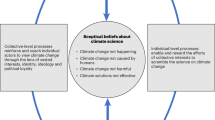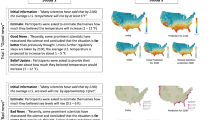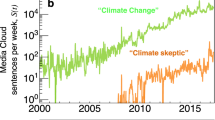Abstract
We examine how attention to science and political news may influence public knowledge, perceived harm, and support for climate mitigation policies. Previous research examining these relationships1,2 has not fully accounted for how political ideology shapes the mental processes through which the public interprets media discourses about climate change. We incorporate political ideology and the concept of motivated cognition into our analysis to compare and contrast two prominent models of opinion formation, the scientific literacy model3,4,5, which posits that disseminating scientific information will move public opinion towards the scientific consensus, and the motivated reasoning model6,7, which posits that individuals will interpret information in a biased manner. Our analysis finds support for both models of opinion formation with key differences across ideological groups. Attention to science news was associated with greater perceptions of harm and knowledge for conservatives, but only additional knowledge for liberals. Supporting the literacy model, greater knowledge was associated with more support for climate mitigation for liberals. In contrast, consistent with motivated reasoning, more knowledgeable conservatives were less supportive of mitigation policy. In addition, attention to political news had a negative association with perceived harm for conservatives but not for liberals.
This is a preview of subscription content, access via your institution
Access options
Subscribe to this journal
Receive 12 print issues and online access
$209.00 per year
only $17.42 per issue
Buy this article
- Purchase on Springer Link
- Instant access to full article PDF
Prices may be subject to local taxes which are calculated during checkout


Similar content being viewed by others
References
Zhao, X., Leiserowitz, A. A., Maibach, E. W. & Roser-Renouf, C. Attention to science/environment news positively predicts and attention to political news negatively predicts global warming risk perceptions and policy support. J. Commun. 61, 713–731 (2011).
Ding, D., Maibach, E. W., Zhao, X., Roser-Renouf, C. & Leiserowitz, A. Support for climate policy and societal action are linked to perceptions about scientific agreement. Nature Clim. Change 1, 462–466 (2011).
Sturgis, P. & Allum, N. Science in society: Re-evaluating the deficit model of public attitudes. Public Underst. Sci. 13, 55–74 (2004).
Bauer, M. W., Allum, N. & Miller, S. What can we learn from 25 years of PUS survey research? Liberating and expanding the agenda. Public Underst. Sci. 16, 79–95 (2007).
Brossard, D. & Lewenstein, B. V. in Communicating Science: New Agendas in Communication (eds Kahlor, L. & Stout, P.) 11–39 (Routledge, 2009).
Kunda, Z. The case for motivated reasoning. Psychol. Bull. 108, 480–498 (1990).
Taber, C. S. & Lodge, M. Motivated skepticism in the evaluation of political beliefs. Am. J. Polit. Sci. 50, 755–769 (2006).
IPCC Climate Change 2007: Impacts, Adaptation and Vulnerability (eds Parry, M. L., Canziani, O. F., Palutikof, J. P., van der Linden, P. J. & Hansen, C. E.) (Cambridge Univ. Press, 2007).
Pew Research Center Publics Policy Priorities Reflect Changing Conditions at Home and Abroad (Pew Research Center, 2015); http://www.people-press.org/2015/01/15/publics-policy-priorities-reflect-changing-conditions-at-home-and-abroad
Nisbet, E. C., Hart, P. S., Myers, T. & Ellithorpe, M. Attitude change in competitive framing environments? Open-/closed-mindedness, framing effects, and climate change. J. Commun. 63, 766–785 (2013).
Myers, T. A., Maibach, E. W., Roser-Renouf, C., Akerlof, K. & Leiserowitz, A. A. The relationship between personal experience and belief in the reality of global warming. Nature Clim. Change 3, 343–347 (2013).
Hart, P. S. & Feldman, L. Threat without efficacy? Climate Change on US Network News. Sci. Commun. 36, 325–351 (2014).
Taber, C. S., Cann, D. & Kucsova, S. The motivated processing of political arguments. Polit. Behav. 31, 137–155 (2009).
Johnson, B. T. & Eagly, A. H. Effects of involvement on persuasion: A meta-analysis. Psychol. Bull. 106, 290–314 (1989).
Lewandowsky, S., Ecker, U. K. H., Seifert, C. M., Schwarz, N. & Cook, J. Misinformation and its correction: continued influence and successful debiasing. Psychol. Sci. Public Interest 13, 106–131 (2012).
Lodge, M. & Taber, C. S. The Rationalizing Voter (Cambridge Univ. Press, 2013).
Hart, P. S. & Nisbet, E. C. Boomerang effects in science communication: How motivated reasoning and identity cues amplify opinion polarization about climate mitigation policies. Commun. Res. 39, 701–723 (2012).
Nisbet, M. C. & Mooney, C. Science and society. Framing science. Science 316, 56 (2007).
Kahan, D. M. Fixing the communications failure. Nature 463, 296–297 (2010).
Hindman, D. B. Mass media flow and differential distribution of politically disputed beliefs: The belief gap hypothesis. J. Mass Commun. Q. 86, 790–808 (2009).
Hindman, D. B. Knowledge gaps, belief gaps, and public opinion about health care reform. J. Mass Commun. Q. 89, 585–605 (2012).
Boykoff, M. T. Lost in translation? United States television news coverage of anthropogenic climate change, 1995–2004. Clim. Change 86, 1–11 (2008).
Nisbet, M. C. & Huge, M. Attention cycles and frames in the plant biotechnology debate managing power and participation through the press/policy connection. Harv. Int. J. Press.-Pol. 11, 3–40 (2006).
Feldman, L., Maibach, E. W., Roser-Renouf, C. & Leiserowitz, A. Climate on cable: The nature and impact of global warming coverage on Fox News, CNN, and MSNBC. Int. J. Press. Pol. 17, 3–31 (2012).
Callegaro, M. & DiSogra, C. Computing response metrics for online panels. Public Opin. Q. 72, 1008–1032 (2008).
Myers, T. A. Goodbye, listwise deletion: Presenting hot deck imputation as an easy and effective tool for handling missing data. Commun. Methods Meas. 5, 297–310 (2011).
Hawthorne, G. & Elliott, P. Imputing cross-sectional missing data: Comparison of common techniques. Aust. N.Z. J. Psychiatry 39, 583–590 (2005).
Acknowledgements
This research was supported by the National Science Foundation (Grant SES-0752876), the Ohio State University School of Communication Miller Research Award, and the Cornell University Agricultural Experiment Station federal formula funds, Project No. NYC-131405, received from Cooperative State Research, Education, and Extension Service, US Department of Agriculture.
Author information
Authors and Affiliations
Contributions
The contribution of the respective authors is as follows: P.S.H. contributed to designing the study, writing the manuscript, and guided data analysis. P.S.H. is responsible for preserving the original data on which the paper is based, verifying that the figures and conclusions accurately reflect the data collected and that manipulations to images are in accordance with Nature journal guidelines, and minimization of obstacles to sharing materials, data and algorithms; E.C.N. contributed to designing the study and writing the manuscript; T.A.M. performed data analysis with MPlus and contributed to writing the manuscript.
Corresponding author
Ethics declarations
Competing interests
The authors declare no competing financial interests.
Supplementary information
Rights and permissions
About this article
Cite this article
Hart, P., Nisbet, E. & Myers, T. Public attention to science and political news and support for climate change mitigation. Nature Clim Change 5, 541–545 (2015). https://doi.org/10.1038/nclimate2577
Received:
Accepted:
Published:
Issue Date:
DOI: https://doi.org/10.1038/nclimate2577
This article is cited by
-
Motivated reasoning about climate change and the influence of Numeracy, Need for Cognition, and the Dark Factor of Personality
Scientific Reports (2024)
-
The effect of traditional media consumption and internet use on environmental attitudes in Europe
Journal of Evolutionary Economics (2023)
-
How do you feel about going green? Modelling environmental sentiments in a growing open economy
Journal of Economic Interaction and Coordination (2023)
-
The influence of learning about carbon dioxide removal (CDR) on support for mitigation policies
Climatic Change (2017)
-
Meta-analyses of the determinants and outcomes of belief in climate change
Nature Climate Change (2016)



